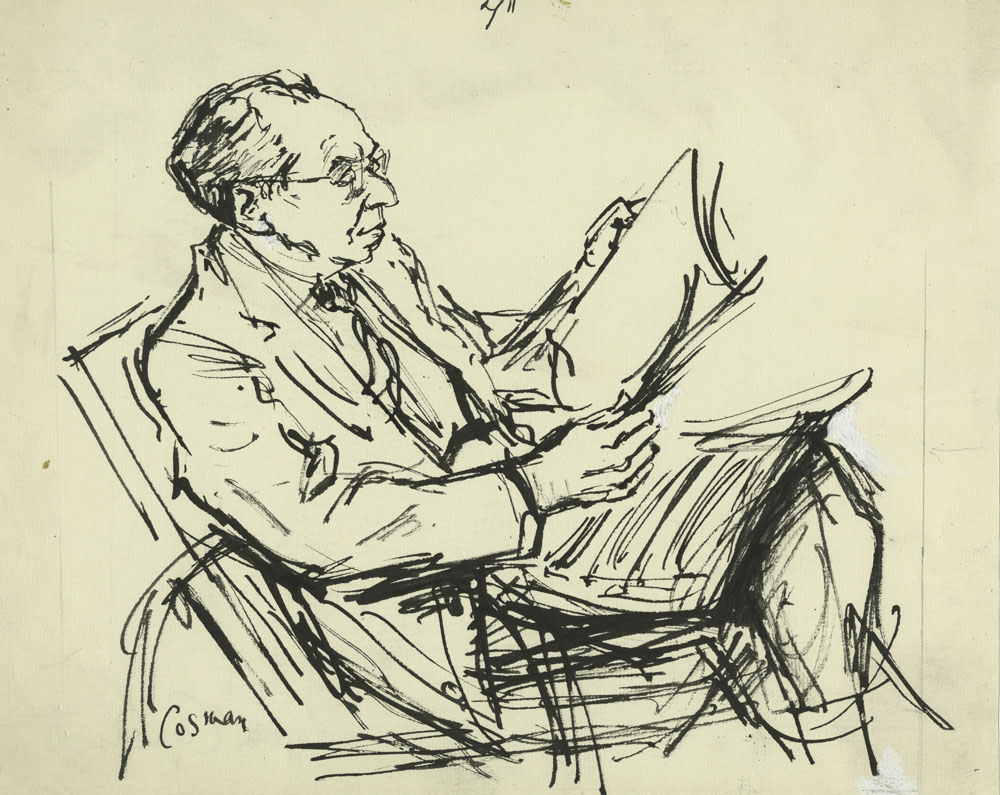
Aaron Copland died on 2 December, 1990. I had just turned 20 and was at Swansea University. I watched the BBC News and there was an obituary. I can remember the black and white images and the music. It was music that spoke to me deeply – It literally struck a chord.
When I like something, I need to know everything about it. I delve and dig. I get this from my Mum. And the more I found out about Copland, the more I found to admire. The decency, the moral compass, the generosity of spirit, the humour, the nurturing mentor. As the years passed, I have often felt his hand on my shoulder. I do feel like his emissary – someone that needs to do something similar to what he did. Widen people’s knowledge and understanding of music, to enable people to listen to music without wearing ear muffs and get a thrill out of it like me.
And yet why me? I’m not a musician! In its way, this is why this feeling is so powerful. Copland changed the way he wrote music to reach out to the masses – to write music with a purpose. It inspired many. But with me it has taken me on a journey way beyond that into the territory of so called “difficult music”. His simple, pretty, ear catching compositions set me on a path that has led to the much more complex and deeply rewarding. So, my role as I now see it is to try and bring others on that same journey.
I have a dream….
I turned 50 back in 2020. In the lead up to this I had this big idea that I was going to do 50 great things in my 50th year. But Covid-19 and the many associated lockdowns completely put paid to that. I therefore decided that my big celebration would take place for my 55th. It wasn’t long before I did the maths and realised that in 2025, Aaron Copland would be celebrating his 125th anniversary. All of a sudden a big idea was formed about combining the two and creating a musical celebration in my own city of Bristol. The idea for Copland 125 was born!
Copland speaks to me from the page
Copland was a fantastic writer. I think he was more prolific writing words than notes. As the idea for Copland 125 has formed and been moulded, there have been frequent occasions when I feel that Copland is helping me steer a course by providing words of wisdom directly from the page.
When I first came up with the plan there were moments of doubt. I am already really busy and have plenty on my plate. I had to convince myself, my wife and then get other people to listen and get them on board too. It was daunting but I must admit that I felt so reassured when I read the following:
The social highlight of my month was a visit with Mrs MacDowell. She was still sharp as a whistle at ninety-two. The realisation that she hadn’t started the (MacDowell) Colony until she was fifty made me feel quite young and energetic about starting something new as I approached my fiftieth birthday.
Copland since 1943
Aaron Copland and Vivian Perlis
Although I have never run a festival before I have done lots of project management. My wife always describes me as a “completer – finisher”. This did feel like Copland slapping me on the back and saying “Go for it!” It was the encouragement I needed.
The initial concept that emerged was a multimedia celebration of the many different angles to Copland’s music. Concerts, films, theatre, ballet. Plenty of artists were interested and it seemed brilliant in my mind’s eye but there was always the nagging question – “where’s the money going to come from?” I also started to doubt that it might be difficult to get people interested in something so fully saturated in the work of one composer – an easier sell for Bach, Mozart or Beethoven perhaps but more challenging for a Copland Fest in the UK.
I think I was a bit naïve at first. I thought that all I would have to do is sow the seeds and get people interested in the concept and organisations that were planning concerts anyway would simply add Copland to the programme and we could label it a Copland 125 concert.
I have done a lot of reaching out and sent dozens of introductory emails. Some have come back immediately. Some have ignored my advances. Some have brushed me off and others have been very enthusiastic. I have also had some great chats with some very important people. It gradually dawned on me that certain things were eminently doable and some things should remain dreams (for now at least!).
Copland conducts and I take note
However, there was a gradual awakening to the fact that if one is to celebrate Copland properly then one needs to draw attention to the many things he strived for in his life. To get new music heard, to get classical music novices, particularly kids listening, engaging and playing and to hone the talents of aspiring composers.
Whilst the Copland 125 concept was developed, stripped back and revised I have found Copland’s writing has been integral in getting me to the right place: a future facing, year long, grass roots music festival aimed at children, young artists and aspiring composers
Here are some of the passages that jumped out from the page at me:
Not all listeners, however, are lending their ears as they should. Very often I get the impression that audiences seem to think that the endless repetition of a small body of entrenched masterworks is all that is required for a ripe musical culture. As a matter of fact, this continual preoccupation with the embalmed masterwork to the exclusion of any lesser music is one of the outstanding signs of immaturity*. There appears to be an unwritten understanding that our musical public is interested in listening only to the best, the greatest, the finest in music. Nothing less than an immortal masterwork penned by an immortal composer seems to be worth their attention. This assumption is fostered by the attitude, almost unconscious by now of musical conservatories, radio commentators, recording companies.
………Being alive seems to relegate the composer automatically to the position of an “also ran”
………Needless to say, I have no quarrel with masterpieces. I think I revere and enjoy them as well as the next fellow. But when they are used unwittingly perhaps, to stifle contemporary effort in our own country, then I am almost tempted to take the most extreme view and say that we should be better off without them!
Composers without a Halo. From The New Music 1900-1960
* Please note: Taken out of context this may seem a bit haughty. However, Copland here is talking about the “immaturity” of a musical culture in the USA as a whole, not the immaturity of the individual concert goer.
The plain fact is that the composer of our century has earned the right to be considered a master of new sonorous images. Because of him (and her!) music behaves differently, its textures are different-more crowded or more spacious, it sings differently, it rears itself more suddenly and plunges more precipitously. It even stops differently. But it shares with older music the expression of basic human emotions, even though at times it may seem more painful, more nostalgic, more obscure, more hectic, more sarcastic. Whatever else it may be, it is the voice of our own age and in that sense it needs no apology.
What we need in music is people with the vision of those who founded the Museum of Modern Art twenty-five years ago, people willing to spend for the sake of the future of art and the cultural health of the community. If new music is “poison in the box office”, it is the responsibility of those who direct our cultural organisations to find funds sufficient to counteract this poison. Otherwise, conductors and performers will gradually become nothing more than mummified guardians of a musical museum, while composers look for other outlets for their creative energies.
“Are my ears on wrong?” A Polemic. From Copland on Music
(original article from the New York Times magazine 1955.
Apathy in the making of programs-giving the public what it wants and nothing but what it wants-leads to the complete stagnation of music as an art. Can anyone seriously maintain that that is all that lies ahead? In some way, not clear to me as yet, we must persuade the interpreter to take a hand in the making of musical history by letting us hear the full sonorous range of music’s past and present.
Interpreters and New Music. From Copland on Music
(original article from the London Sunday Times October 12, 1958.
Another reason, no doubt, for the poor place of the composer in the public’s horizon, is his (or her) difficulty in being heard. As we all know, the majority of plays and books published are new, but seven-eighths of the music performed is old.
The American Composer Gets a Break (1935).
From: Aaron Copland: A Reader – Selected writings 1923-1972.
The key to a healthy orchestral future is now, as it always has been, the quality and balance of its program make up. This has been pointed out many times, with little or no result. No other art shows a similar imbalance between old and new works presented. No other art attempts to live so exclusively on works of the past. This may provide a temporary solution but it builds to no future, for no live art can exist forever on a diet of past glories alone.
The Dilemma of Our Symphony Orchestras
Address delivered at the Providence R.I., convention of the American Symphony Orchestra League in June 1956.
From Copland on Music.
The idea of an opera for high school performers appealed to the press, I suppose, for the same reason it appealed to me. There’s a certain excitement in hearing your music sung and played by an enthusiastic group of youngsters that no highly trained organisation of grown-up professionals can produce.
Copland 1900-1942
Aaron Copland and Vivian Perlis
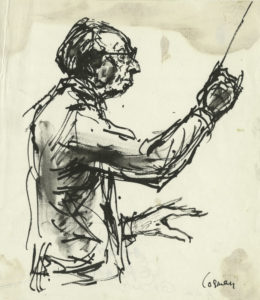
© The Cosman Keller Art & Music Trust, original held in the RCM Museum LDRCM.2018.12.12
It seems that Copland was preempting my frustrations all those years ago.
A music festival in my own city? I don’t want that to be a dream. I want it to be a reality. Nearly 100 years ago Copland was creating concert series to showcase unknown young composers. 90 years ago he was composing operas and orchestral pieces for kids to perform.
I want to do the same by curating a festival that celebrates the living and the recently passed and is inclusive and diverse and provides expansive exposure opportunities that go far beyond the concert venue norm. A festival that reflects modern society and speaks about issues of our time, helping to reframe classical music making it relevant to a wider demographic.
I do honestly feel that Copland reached out his hand through that old TV set and pointed a finger at me and said “You”. And I said “Who me” and he said “Yes you!”
Stay tuned
The funding bid to Arts Council England is nearly ready to be submitted. I’ll be able to provide more information on the Copland 125 mission, programme and partners very soon. Of course, the ACE grant funding (if successful) is just part of the puzzle. We will need other sources of income too – obviously people to turn out as audience members but we have also launched a Crowd Funding appeal. In addition, I would love to hear from you if you have interest in helping out in any way – through a Crowd Sourcing initiative.
 Picture credits
Picture credits
The two images here are sketches by Milein Cosman. They appear in the book Aaron Copland by Neil Butterworth. Copyright is held by the Cosman Keller Art & Music Trust. The original drawings can be located in the Royal College of Music Museum as part of the Cosman Collection (alongside many more of Milein Cosman’s drawings of Copland and other 20th-century musicians). They have 17 drawings of Copland catalogued. There is a permanent display of a selection of Milein Cosman’s drawings in the RCM’s Lavery Gallery, which anyone can visit at any time. To see specific drawings that are not currently exhibited, you will probably need to make an appointment beforehand with the Museum staff, so they can get them out for you.
Thanks to Alison Garnham (Chair of Trustees, The Cosman Keller Art & Music Trust) for the permission and the additional information above.
Title picture: © The Cosman Keller Art & Music Trust, original held in the RCM Museum LDRCM.2018.12.4

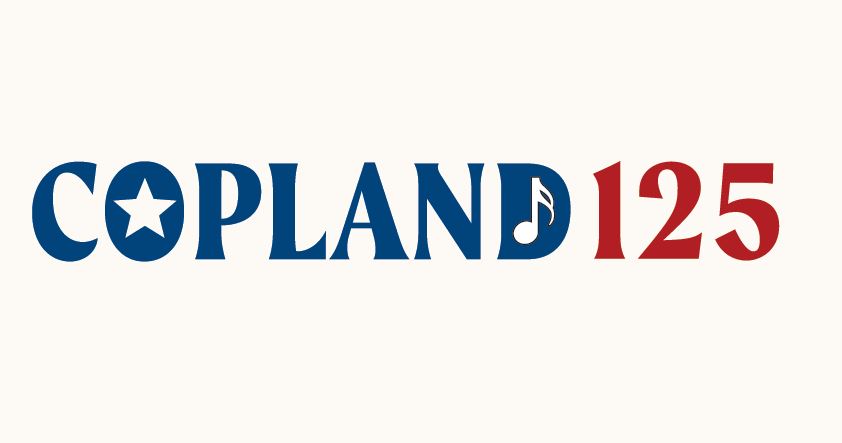
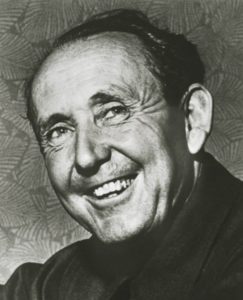

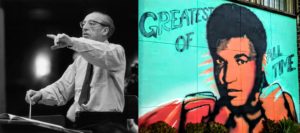
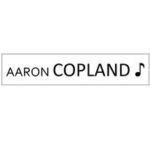




Leave a Comment